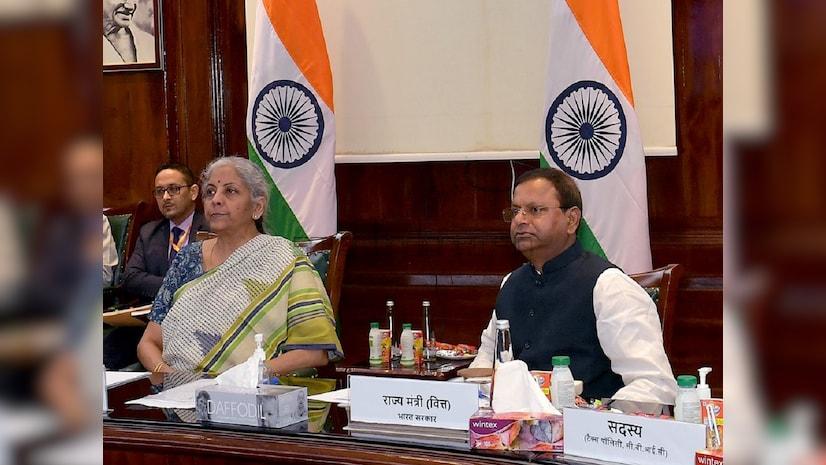On Monday, the GST Council is anticipated to discuss numerous topics, such as how to tax insurance premiums, the government of Maharashtra’s recommendations on adjusting tax rates, and an update regarding the status of online gambling, according to sources.
Information indicates that the group responsible for approving installations, made up of both national and regional tax authorities, will unveil an analysis on the GST applied to premiums for life, health, and reinsurance policies, along with the financial consequences. To get in touch with us through WhatsApp, please visit the provided link.
Led by the Finance Minister Nirmala Sitharaman and made up of state ministers, the GST Council will determine if it should lower the tax rate on health insurance from the present 18 percent or if it should exempt specific groups of people, such as the elderly.
The discussions will also take place concerning the reduction in goods and services tax (GST) on life insurance premiums.
During the 2023-24 financial year, the federal government and various states gathered a total of Rs 8,262.94 crore in tax revenue from health insurance premium payments, and Rs 1,484.36 crore came from taxes on health reinsurance premiums.
Taxation on insurance premium charges was a topic of debate in Parliament, with opposition voices calling for the exemption of health and life insurance premiums from Goods and Services Tax (GST). Transport Minister Nitin Gadkari also reached out to Finance Minister Nirmala Sitharaman to express concerns over this matter.Further Details:
– NaBFID MD asserts that infrastructure loan losses are minimal, questioning the Reserve Bank of India’s 5% provision requirement proposal.
– Foreign Exchange reserves have hit a new high, surpassing the previous record of $683.9 billion, according to MaFID MD.
– Banks are developing a Unified Recovery Interface to improve their operational effectiveness.
– The Indian rupee is currently the second-worst performing Asian currency against the US dollar in August.
– The rupee has risen by 2 paise, closing at 83.95 against the US dollar during the early trading session.
In her response during the debate over the Finance Bill, the Finance Minister Nirmala Sitharaman mentioned that 75% of the GST revenues are distributed to the states. She advised the opposition members to request their respective state finance ministers to present the proposal at the GST Council.
The Finance Minister of West Bengal, Chandrima Bhattacharya, brought up the matter during last month’s Group of Ministers (GoM) meeting, and it was subsequently sent to the fittment committee for more in-depth data review.
The Government Ministry has stated that it opposes any modifications to the current four-tier Goods and Services Tax (GST) slab, which consists of 5, 12, 18, and 28 percent rates. Nonetheless, the panel has requested the goods and services committee to investigate potential opportunities for streamlining the rates of goods and services.
Concerning web-based gaming, tax officials from both Centre and state levels are set to deliver a “status update” to the GST Council. This update will cover the amount of GST revenue gathered from the web-based gaming industry prior to and following October 1, 2023.
Starting October 1, 2023, individuals making basic wagers on websites and gambling venues faced a 28 per cent Goods and Services Tax. Before this change, numerous online gambling firms were not required to collect the 28 per cent GST, claiming that there were varied tax laws for activities depending on luck versus skill.
During their meeting in August 2023, the GST Council made it clear that online gaming platforms needed to pay a 28 percent tax rate. Following this, the Central GST Act was modified to ensure the taxation rules were unambiguous.
Virtual gaming platforms located abroad were required to be registered with the GST authorities and to pay taxes, or else the government would shut down those platforms.
After six months had passed since the taxation on the online gaming sector was put into effect, the council had then chosen to evaluate the tax policy for the industry.
Inquiries indicated that the Council would discuss the current tax situation within the industry and the prospect of altering tax rates is highly unlikely.
In addition, the Council is expected to be informed regarding the current efforts to crack down on counterfeit registrations, the achievements of these efforts, and the measures implemented against such organizations. The complete figure of potential GST fraud would also be disclosed to the Council.
The initiative, starting on August 16, 2024, and extending until October 15, 2024, targets the identification of dubious or counterfeit Goods and Services Tax Identification Numbers (GSTINs). It involves the necessary checks for verification and additional measures to eliminate these fraudulent invoices.
During the initial period from May 16, 2023, to July 15, 2023, it was found that a total of 21,791 entities, 11,392 related to state tax registration and 10,399 related to CBIC registration, that had obtained GST registration were found to be without any actual registration.
A total of Rs 24,010 crore (including Rs 8,805 crore from the state and Rs 15,205 crore from the central government) of potential tax fraud was uncovered during the specific operation.
Additionally, the Council granted approvals for various notices, such as the one for the amnesty scheme that was unveiled at the previous council gathering. The council also reached a decision on different modifications to the GST legislation during its prior meeting on June 22, which were subsequently enacted by Parliament last month through the Finance Act, 2024.
In the June council session, various taxpayer-friendly steps were adopted, such as the elimination of interest and fees for tax bills for demand notices sent during the initial three-year period of the Goods and Services Tax (GST) laws, covering 2017-18 to 2018-19, 2018-19 to 2019-20, and 2019-20 to 2020. However, these steps would only apply if the total tax owed is settled by March 31, 2025.
To lower the number of lawsuits, the Council has established a financial cap for tax officials regarding their appeal submissions. This cap is set at Rs 20 lakh for appeals to the GST Appellate Tribunal, Rs 1 crore for appeals to the High Court, and Rs 2 crore for appeals to the Supreme Court.
It also suggested cutting down the amount of pre-deposit that taxpayers need to pay before filing their appeals related to goods and services tax (GST).
(Only the headline and accompanying photo have been modified by the Business Standard team; the remainder of the material is automatically generated from a syndicated source.)Additionally:
(i) Tax income from OCI is based on the individual’s residency status as per the IT Act.
(ii) Businesses required to pay Goods and Services Tax (GST) without a registered bank account are prevented from filing their Goods and Service Return Form (GSTR-1) beginning September 1.
(iii) Retailers of masala products face a penalty payment from October if their industrial machines are not officially registered with the tax authorities.
(iv) Automakers, including Hyundai, among others, are mounting a campaign against the promotion of hybrid vehicles, as the competition with Toyota intensifies.
(v) The number of instances of falsified Input Tax Credit (ITC) claims has risen by 51% to reach a total of Rs 36,374

